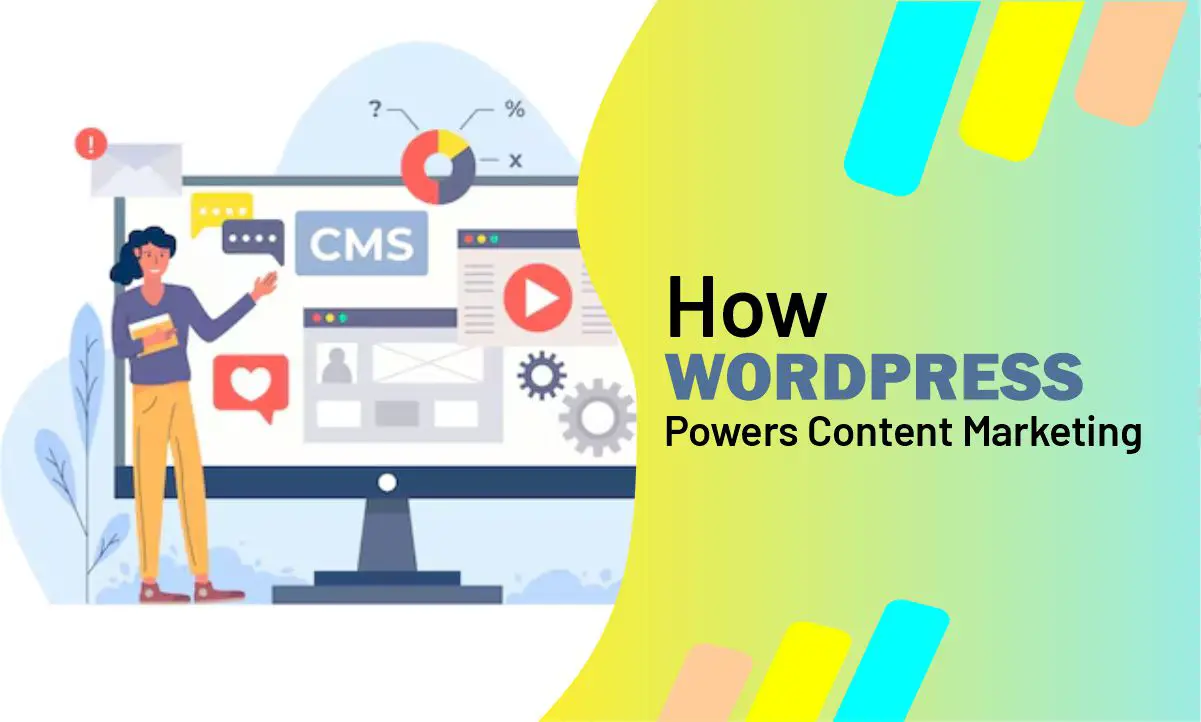In the digital world, content marketing plays a vital role in how businesses attract, engage, and convert potential customers. It involves sharing valuable, relevant, and consistent content to reach a clearly defined audience. From blog posts and product pages to email newsletters and social media updates, content marketing strengthens brand presence and builds customer trust. One of the most powerful tools supporting this strategy is WordPress.
With over 40% of all websites powered by WordPress, it has become the go-to content management system (CMS) for businesses of all sizes. In this guide, we explore how WordPress simplifies content marketing, helps businesses grow online, and delivers an unmatched experience for creators and audiences alike.
Why Content Marketing is Crucial for Businesses
Content marketing outperforms traditional advertising like TV spots, flyers, or cold calls by focusing on value-driven content rather than hard sales. It creates a meaningful relationship between a brand and its audience.
Key Benefits of Content Marketing:
- Increases Brand Awareness: Regular content ensures that your brand stays top-of-mind.
- Builds Trust and Authority: Sharing expertise through articles or guides makes businesses look credible and dependable.
- Improves SEO Performance: Valuable content helps websites rank better in search engines.
- Drives Organic Traffic: Engaging blog posts and pages bring users to your site without paid ads.
- Boosts Conversions: Quality content nurtures leads, increasing the likelihood of turning visitors into paying customers.
Why WordPress is Perfect for Content Marketing
WordPress offers a flexible, scalable, and user-friendly platform that empowers businesses to create, organize, and promote their content effectively.
Top Reasons to Use WordPress for Content Marketing:
- Ease of Use: No technical expertise needed to create and manage content.
- Customizable Themes: Thousands of free and premium themes are available to match any brand aesthetic.
- Extensive Plugin Library: Add functionality like SEO tools, contact forms, analytics, and more.
- SEO-Friendly Architecture: Built-in features and plugins help optimize content for search engines.
- Multimedia Support: Easily upload and manage images, videos, podcasts, infographics, and more.
Setting Clear Goals Before You Begin
Before diving into WordPress content creation, businesses should define specific marketing goals. These could include:
- Building a subscriber list
- Increasing website traffic
- Generating leads
- Improving customer retention
- Boosting brand visibility on search engines
Having clear goals helps shape your content strategy and measure success.
How to Launch Content Marketing on WordPress

1. Choose the Right Theme
A website’s appearance greatly impacts user experience and engagement. A well-designed theme should be:
- Mobile-Responsive: Over 60% of web traffic comes from mobile devices.
- SEO-Optimized: Helps your site get indexed and ranked by search engines.
- Customizable: Allows brand consistency with fonts, colors, and layouts.
Popular WordPress Themes for Marketers: Astra, OceanWP, GeneratePress, Kadence, Neve.
Some themes come with built-in page builders like Elementor or Gutenberg, making it easy to create professional pages without coding.
2. Set Up Essential Pages
Every WordPress site should include the following pages:
- Homepage: A snapshot of what you offer.
- About Page: Builds trust by telling your story.
- Contact Page: Allows users to get in touch.
- Blog: The central hub for your content marketing.
- Product/Service Pages: Detailed info for conversions.
3. Plan a Content Calendar
A content calendar ensures you publish consistently. Planning helps avoid last-minute rushes and allows time to optimize posts. Your calendar can include:
- Blog post ideas and publishing dates
- Social media content
- Newsletter topics
- Seasonal campaigns
Pro Tip: Use editorial calendar plugins like Editorial Calendar, Strive, or CoSchedule to organize your content efforts within WordPress.
4. Use Categories and Tags Wisely
Organizing content with WordPress categories and tags improves site navigation and SEO. Categories represent broad topics, while tags are more specific.
For example:
- Category: Digital Marketing
- Tags: SEO, PPC, Google Ads
This makes it easier for users and search engines to find relevant content.
Creating High-Quality, Engaging Content
The heart of content marketing is delivering value. Your WordPress site should host content that informs, educates, entertains, or solves a problem.
Popular WordPress Content Types:
- Blog Posts: Ideal for news, updates, how-tos, and storytelling.
- Pages: Great for evergreen content like services, FAQs, and policies.
- Media Content: Images, videos, and audio enrich user experience.
- Infographics and Guides: Visually present complex data or instructions.
Tips for Better Content:
- Use headings and subheadings (H2, H3) for structure.
- Include bullet points and short paragraphs for readability.
- Add internal links to related content.
- Focus on a conversational tone to improve engagement.
Optimizing Content for SEO
Search engine optimization (SEO) is essential for visibility. WordPress simplifies SEO through both built-in features and plugins.
Essential SEO Practices:
- Add a focus keyword to titles, headers, and body content.
- Use meta titles and meta descriptions.
- Include alt text for all images.
- Structure content with header tags (H1, H2, H3).
- Create XML sitemaps for indexing.
Top SEO Plugins for WordPress:
- Yoast SEO: Offers on-page SEO recommendations and snippet previews.
- All in One SEO Pack: Powerful SEO features for beginners and pros.
- Rank Math: Advanced features with a user-friendly interface.
Enhancing Your Website with Multimedia
Multimedia brings content to life and boosts user retention. WordPress allows easy upload and embedding of:
- Images (JPG, PNG, WebP)
- Videos (MP4 or YouTube embeds)
- Podcasts (MP3 or Spotify embeds)
- Slideshows and PDFs
Plugins for Media Management:
- Smush or ShortPixel (image optimization)
- Envira Gallery (image display)
- EmbedPress (for video and audio)
Fast-loading media not only improves user experience but also contributes to better SEO rankings.
Connecting Content with Social Media
Social media extends your content’s reach. WordPress integrates seamlessly with major platforms.
Key Features:
- Social Sharing Buttons: Let readers share posts instantly.
- Social Feeds: Display real-time Facebook, Instagram, or X (Twitter) feeds.
- Auto-Posting: Automatically publish content to social media using tools like Jetpack or Buffer.
Recommended Plugins:
- Social Warfare
- Monarch by Elegant Themes
- Smash Balloon Social Feeds
Engaging with users on social platforms builds brand awareness and drives more traffic to your WordPress site.
Choosing the Right Hosting Provider
Website performance directly affects user experience and SEO. Choosing reliable hosting ensures your site loads fast and remains secure.
What to Look for in Hosting:
- Fast loading speeds (under 2 seconds)
- Uptime guarantee (99.9% or higher)
- Free SSL certificates
- Automatic backups and updates
- Scalability for traffic spikes
Top Managed WordPress Hosting Providers:
Managed hosting providers offer tools tailored to WordPress users, such as staging environments and performance monitoring.
Using Must-Have WordPress Plugins for Content Marketing
Plugins extend the functionality of WordPress and simplify content marketing tasks. Here are essential ones to consider:
- Yoast SEO: Optimizes posts for search engines.
- WPForms: Easily create contact forms, quizzes, and surveys.
- Mailchimp for WordPress: Grow your email subscriber list.
- MonsterInsights: Connects Google Analytics for in-depth performance tracking.
- Elementor: Drag-and-drop page builder for custom layouts.
Installing and configuring these plugins improves content delivery, SEO, and audience engagement.
Measuring and Improving Performance
Tracking results is crucial for optimizing content marketing strategies. WordPress makes analytics easy with tools and plugins.
Key Metrics to Track:
- Page views and unique visitors
- Bounce rate and time on page
- Conversion rate
- Top-performing content
Analytics Tools:
- Google Analytics via MonsterInsights
- Jetpack Site Stats
- Hotjar for heatmaps and behavior insights
Regularly reviewing performance helps refine strategies and maximize ROI.
How to Leverage WordPress Features for Powerful Content Marketing
WordPress is more than just a blogging platform—it’s a comprehensive content management system that equips businesses with the tools they need to create, manage, and optimize their content marketing efforts. From advanced publishing options to integrations with marketing tools, WordPress supports the entire content lifecycle: creation, distribution, and performance tracking.
Use Custom Post Types to Structure Content Effectively
While most users are familiar with standard posts and pages, WordPress also supports custom post types, which can significantly improve content organization. These allow businesses to publish specific types of content in a more structured and user-friendly way.
Examples include:
- Case Studies – Highlight successful client projects and real-world applications of your products/services.
- Testimonials – Showcase positive customer feedback to build credibility and trust.
- Product Reviews – Offer in-depth reviews to guide potential buyers and boost conversions.
Using custom post types enhances both site navigation and user experience, helping visitors find relevant information more quickly.
Plan Ahead with Post Scheduling
Consistency is a core pillar of successful content marketing. WordPress makes it easy to schedule content in advance, allowing you to publish posts at optimal times without being online 24/7. Brands can develop weekly or monthly editorial calendars, ensuring a steady stream of content that keeps audiences engaged and returning for more.
Streamline Team Efforts with Multi-User Access
For businesses with a content team, WordPress supports multi-user roles and permissions. You can assign roles such as:
- Administrator
- Editor
- Author
- Contributor
This helps streamline editorial workflows, maintain content quality, and ensure secure access based on team responsibilities—ideal for agencies and growing businesses.
Boost Engagement with Interactive Features

Interactive content keeps users on your site longer and increases engagement. WordPress supports various plugins and integrations that allow you to add interactive components like:
- Quizzes and Polls – Engage users by inviting their input and preferences.
- Live Chat Tools – Improve customer support and real-time communication.
- Webinars and Live Streaming – Build community and educate your audience in a more dynamic format.
These features make your content more compelling and help convert passive readers into active participants.
Final Thoughts: Growing Your Business with WordPress Content Marketing
Content marketing is one of the most effective strategies for long-term business growth—and WordPress is the perfect platform to power it. With intuitive tools, powerful plugins, customizable themes, and a massive user community, WordPress enables any business to start and scale a content-driven digital presence.
Whether you’re a startup looking to build authority or an enterprise aiming to generate more leads, content marketing through WordPress offers everything you need.
Get started today: Choose a quality theme, create valuable content, optimize for SEO, and leverage plugins to enhance your performance. The sooner you publish great content, the sooner you’ll attract and convert your ideal customers.

